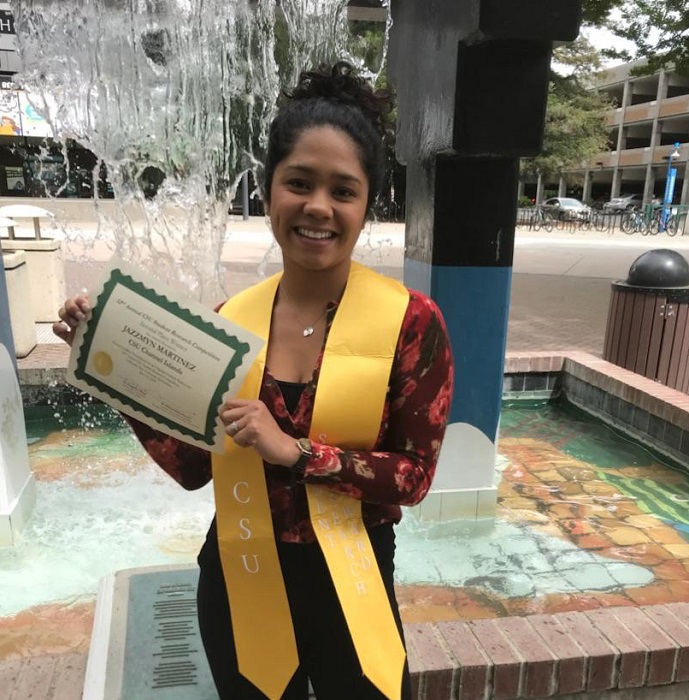 May 16, 2018 — Growing up in Santa Barbara with five generations of women got 25-year-old CSU Channel Islands (CSUCI) Sociology senior Jazzmyn Martinez wondering about the changing definition of “adulting” through the decades.
May 16, 2018 — Growing up in Santa Barbara with five generations of women got 25-year-old CSU Channel Islands (CSUCI) Sociology senior Jazzmyn Martinez wondering about the changing definition of “adulting” through the decades.
The research project she launched, called “When Adulting Gets Real: Examining Parenthood and Marital Status among Young Adults in Ventura County,” recently earned her 2nd place in her division in the 32nd Annual CSU Student Research Competition, in which all 23 CSU campuses competed.
Held this year on May 4-5 at CSU Sacramento, the system-wide competition showcases undergraduate and graduate research that represents the full range of academic programs offered by the CSU campuses. Student competitors made oral presentations before juries of professionals from major corporations, foundations, public agencies, colleges and universities in California.
Martinez placed second in the Undergraduate session in Behavioral and Social Sciences. She said she was inspired to do the research when she began making plans to get married.
“I got engaged in March and I just kind of wanted to see where I fell in terms of my age group,” Martinez said. “I wanted to see the difference between my mom’s generation and my generation.”
From a sociological viewpoint, adulthood is defined by such hallmarks as having a job, owning a home and living independently. For her research, Martinez broke it down to two primary adult milestones: being married and having children.
She studied young adults ages 25 to 34 using data from the U.S. Census Bureau, comparing the 2011-2015 American Community Survey for Ventura County to data from 1990, when Martinez’s mother would have been in this age group.
“In 1990, young adults were more likely to follow a traditional path through adulthood by getting married and becoming homeowners,” Martinez said. “Millennials are more likely to push marriage and homeownership to the side and instead live at home and get an education.”
“The impressive thing about Jazzmyn’s research is how she thought critically about her recent life events—in her case, recently becoming engaged—and how that compares to current population trends among young adults,” said her faculty mentor, Assistant Professor of Sociology Luis A. Sanchez, PhD.
“The social and economic landscape of the United States is drastically different from previous decades and her research provides a clear portrait of how today’s young adults are substantially less likely to enter into marriage and become homeowners.”
Martinez also drew on work published by renowned 20th century German sociologist Karl Mannheim, who theorized that socio-historical events that occur during the collective youth of a generation tend to shape the course of their lives.
True to Mannheim’s theory, Martinez believes socio-historical events have helped shape the trajectory of the lives of Millennials.
“The job market is becoming tighter, and that’s one factor. The housing crisis is another,” she said. “Even here in Santa Barbara, my fiancé and I may have to get a roommate. A two-bedroom apartment is about $2,400.”
After graduation, Martinez plans to study for the Law School Admission Test (LSAT) and hopefully get into law school with an emphasis on family law.
